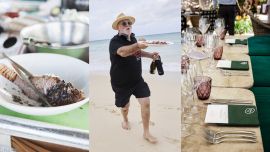THE WEEK IN CORONAVIRUS
The lives claimed by coronavirus climbed from 33,348 to 35,045 between last weekend and yesterday while the confirmed cases of contagion rose from 1,236,851 to 1,296,378. Last weekend saw the most famous name so far added to Argentina’s Covid-19 victims – 84-year-old film director and ex-senator Fernando “Pino” Solanas, a beacon of progressive causes, who died on Saturday in intensive therapy in Paris where he was serving as ambassador to UNESCO. Confirmation at the close of the previous week of an agreement to deliver 22 million doses of the Oxford–AstraZeneca vaccine set in motion a trending topic for this week with opinion polls registering doubts among percentages approximating or even topping a quarter of the population – opinions were split down the middle over Russia’s Sputnik V vaccine in particular. Monday’s claim by Pfizer that its vaccine was 90 percent effective caused a positive buzz worldwide – two days later Sputnik V claimed to be 92 percent effective. By the end of the week Argentina was only surpassed in the region by Peru for deaths per million, sixth worldwide.
BIELSA RESIGNS (NO, NOT THAT ONE)
The first Cabinet change in 11 months of the Alberto Fernández presidency materialised in midweek with the resignation of Housing Minister María Eugenia Bielsa on Wednesday following several days of rumours, with Avellaneda Mayor Jorge Ferraresi (barred from re-election by current legislation due to being in his third consecutive term) lined up to replace her. Although heading a key portfolio with the central importance of housing shortages flagged by the recent proliferation of squatter problems, Bielsa never managed to shake off the shadow of the coronavirus pandemic arriving so early in her ministry – critics also pointed to her lack of administrative experience.
IMF TEAM IN TOWN
An International Monetary Fund (IMF) mission arrived and started a series of meetings as from Tuesday but still early days for any concrete conclusions by the end of the week. The government is requesting an Extended Fund Facility to postpone repayment of the IMF’s US$44-billion stand-by loan further (a 54-month grace period is sought), being prepared to discuss structural reforms in return. Among these are a new formula for updating pensions and family benefits, which will remove any index-linking for inflation (predictably rejected by the opposition), while all pandemic wage and income supplements have been weeded out of the 2021 budget (returned to the lower house by the Senate on Thursday for “corrections”).
OCTOBER INFLATION 3.8%
Last month’s inflation clocked in at 3.8 percent, the highest thus far this year, INDEC statistics bureau announced on Thursday. Food and beverages proved the main culprit at 4.8 percent (although garments rose 6.2 percent) as price controls start to fade amid a more general relaxation of lockdown. Inflation so far this year thus totals 26.9 percent and 37.2 percent for the last 12 months. The surging demand for consumer goods from those unable to convert their pesos into dollars is expected to keep inflation on the rise.
MARKETS UPDATE
A fortnight of calm achieved by the successful sales of dollar-linked peso bonds started to slip in midweek and the “blue” parallel dollar, which had fallen to 157 pesos from 195 at the close of October, had risen to 172 pesos by the close of the week. But the legal alternative CCL and MEP exchange rates dipped slightly this week – 0.3 percent and 0.2 percent respectively – to close around the 145-peso mark. The official exchange rate at Banco Nación closed at 85 pesos or 140.70 pesos with its 65 percent surcharges. With the government talking to the International Monetary Fund, country risk stayed subdued at 1,345 points.
EYE ON BOLIVIA
President Alberto Fernández attended the inauguration of his new Bolivian colleague Luis Arce in La Paz last weekend (one of only three South American presidents to do so, alongside Colombia and Paraguay), stopping off on the way back at the border town of La Quiaca to escort Bolivian ex-president Evo Morales (in exile in Argentina for fully a year) back to his native country. The latter initiative had negative consequences since the Covid-19 infection of Strategic Affairs Secretary Gustavo Beliz attending a dinner to see Morales off led to the President and much of his inner cabinet having to go into isolation although by press time nobody else in the group had tested positive with the Ferenández denying any symptoms.
ROSSI VERSUS BOSSI
Defence Minister Agustín Rossi on Thursday said that he was considering denouncing the new liaison panel for the security forces announced the previous day as a possible conspiracy against democracy, also pointing out that various legitimate groupings such as the association of Malvinas war veterans had not joined it. Rossi described one of the panel’s organisers, Retired Major-General Ernesto Bossi, as “a born conspirator.” The Mesa del Encuentro Libertador General San Martín, which includes Retired Lieutenant-General Claudio Pasqualini (Army chief-of-staff until the change of government last year) among its members, includes pay issues as well as the general defence of the reputation of the armed and police forces among its objectives – something which makes the government nervous with the Buenos Aires provincial police protest two months ago a recent memory.
ANOTHER BANDERAZO
The eighth “banderazo” anti-government protest was held nationwide last Sunday with the previous week’s Supreme Court ruling (which strictly subordinated all past, present and future appointments to the Senate, at least potentially) the main but not the only target. While there were 200 concentration points around the country, a six-block downtown motorcade converging on the Obelisk was the biggest protest.
BULLRICH EXPENSES ROW
Patricia Bullrich, the ex-minister who chairs Mauricio Macri’s PRO centre-right party, on Wednesday apologised for travelling to last Sunday’s “banderazo” protest in Córdoba using the expenses of local national senator Laura Rodríguez Machado (a PRO party colleague accompanying her constantly on the march), saying that although legal, this mechanism was not considered ethical and assuring that she would return the money (with no word on two aides joining her). For her part Senator Rodríguez Machado considered attack the best means of defence, retorting that the government had "used a Hercules (aircraft) to take (ex-president) Evo Morales to Bolivia, I don’t know if that is legal," adding that the legality of Bullrich’s trip was not in doubt, aside from the ethical angle.
KKK PROTEST?!?
Ripples from the United States election have reached Patagonia – in Bariloche three demonstrators participating in last Sunday’s nationwide “banderazo” protest had no better idea than to don Ku Klux Klan garb in order to express their rejection of vaccination in general and Sputnik V in particular, also protesting against legalising abortion by displaying a giant dummy foetus draped in an Argentine flag. Most in the sparsely attended demonstration centred their protests against the government’s judicial initiatives like the rest of the country but some also rejected the occupation of Villa Mascardi by the Winkul Lafken Mapu group of Mapuche militants – the echoes of the US election in Bariloche were anything but “Black Lives Matter.”
CANNABIS FOR MEDICINAL USE
The government on Thursday legalised the cultivation of cannabis for personal medical use by individuals and networks, as well as the sale of creams and oils made from the plant in pharmacies, with the publication of Decree 883/2020 in the Official Gazette, following in the 2013 footsteps of Uruguay.
related news

Mar del Plata: Man in arrested for hitting vehicle in President Milei's motorcade

The eclipse of traditional faith? The religious shift redefining Argentina and Latin America

Argentina's country risk rating falls below 500 points for first time in 8 years

















Comments